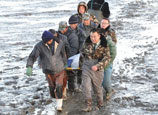
WASHINGTON, Nov. 28 (Xinhua) -- U.S. President Barack Obama's first big test after re-election is averting the impending "fiscal cliff," a feat he cannot pull off without reaching across the cavernous partisan gap and working with opponents in Congress.
The "fiscal cliff," the tax hikes and spending cuts due to kick in at yearend if Congress and the White House cannot agree on a budget, could spark another recession even as the economy struggles to recover from the worst downturn in decades.
At issue is whether Democrats and Republicans can agree on taxes on upper income earners. Obama wants to increase their tax rates, arguing they must pay their fair share, while Republicans contend upper earners are the economy's driving force and taxing them will hurt an economy that continues to struggle toward recovery.
Agreeing on anything, let alone such a major issue, will be no easy task, as Congress remains bitterly divided after a presidential election earlier this month that left much unchanged, with Republicans still controlling the House, Democrats still comprising the Senate majority and Obama still in the White House.
Hammering out an agreement will require strong leadership from the White House, but critics charge Obama with shirking his leadership roll. Opponents say Friday's planned trip to the Philadelphia area in a bid to drum up support for an upper income tax hike shows Obama is in permanent campaign mode.
"I think he should get off the campaign trail and spend his time at the White House," said former Republican Senator from Ohio George Voinovich at a Brookings Institution panel Wednesday.
 |














 Detective-Conan-themed Lawson convenience store opens in Shanghai
Detective-Conan-themed Lawson convenience store opens in Shanghai


![]()
